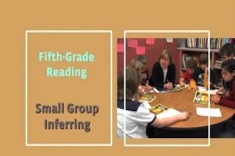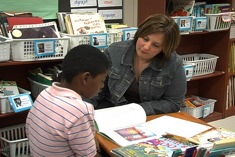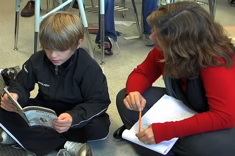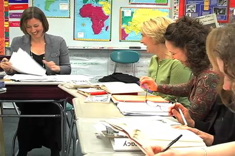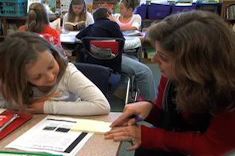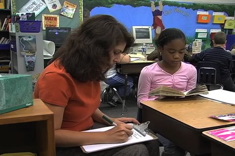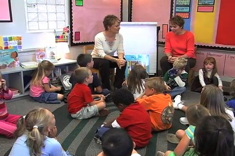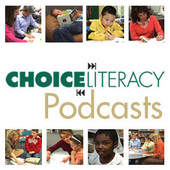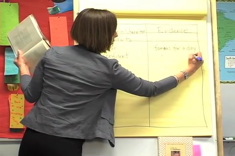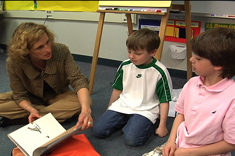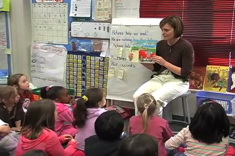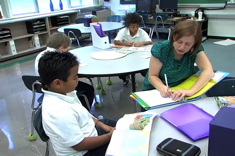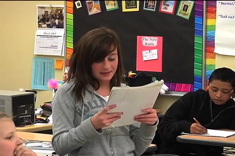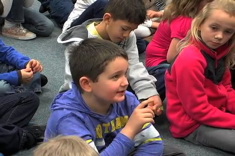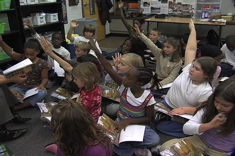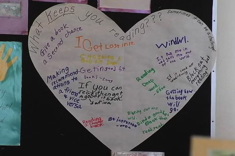Reading Strategies
Are your students buried in post-its? Oversharing with those text-to-self connections? Parroting back comprehension tips but rarely applying them when they are actually reading? Our contributors sort through what works with strategy instruction, and have wise advice for avoiding superficial approaches to developing comprehension skills.
Latest Content
Focused Independent Reading in Second Grade
Sean Moore demonstrates how he helps students focus their independent reading with preparation and then with discussion after reading.
Inferring Small Group in 5th Grade
Karen Terlecky meets with a small group in her 5th grade class to discuss the strategy of inferring.
Conferring About Inferring
This reading conference from Katie Doherty’s middle school classroom builds on the whole-class lesson, and demonstrates the value of partner reading for older students.
Middle School Conferring About a Series
In this video from Katie Doherty’s sixth-grade classroom, Katie confers with a student who has returned to a series book she had previously rejected. Katie weaves in talk about strategies, particularly inferring (a focus of whole-class minilessons).
Accuracy and Comprehension: Conferring in Second Grade
In this video from Sean Moore’s second-grade classroom, Sean confers with a student who comprehends text well but has some issues with accuracy.
Next-Read Stack: Conferring for Independence
Franki Sibberson explains the value of "Next-Read Stack" conferences for fostering independence, and includes a video example.
Conferring About Chunking Words in Second Grade
Sean Moore confers with a 2nd grader who is learning the strategy of chunking words in reading. Notice how Sean focuses the student, refers to previous conferences, and previews an upcoming whole-class reading.
Stop and Track: Conferring with a Fifth-Grade Reader
In this conference with a 5th grader, Aimee Buckner shares two strategies — one to use when putting a book away between readings, and another to help keep track of characters in a complex narrative where the point of view is constantly shifting.
Fluency in Focus: Conferring with Jake
Gail Boushey confers with Jake, a seven-year-old who is setting a reading goal of developing fluency. After the conference, she debriefs with Joan Moser.
Planning for a Demonstration Lesson Part 1
In this first installment of a video series, Clare Landrigan takes a team of grades 3-5 teachers through the steps of planning for a demonstration lesson.
Synthesis in Reading and the Reading Notebook
Beth Lawson helps one of her 3rd grade students write in response to a complex text he is reading, talking through how the writing might help him synthesize the plot of the story.
Guided Reading in Perspective
Cathy Mere puts guided reading in perspective, explaining how it works as one piece of the puzzle when it comes to fostering a lifelong love of reading in students.
Main Ideas, Summaries, and Notes in a Reading Conference
In this conference with a fourth grader, Aimee Buckner tackles text choice, notes, and main ideas all in less than five minutes. You’ll notice teachers observing in the background; the conference is part of a demonstration lesson sequence.
Conferring About Rereading Strategies
In this conference with a fourth grader, Aimee Buckner guides a child to think more deeply and critically about a book being read to the whole class, Goblins in the Castle.
Grades K-2 Fluency Lesson
In this video from a K-2 multiage classroom, Joan Moser and Gail Boushey ("The Sisters") present a fluency lesson to the whole class.
Inferring and Synthesis: Conferring Over Series Books
Beth Lawson shows how to get the most from a conference about series books in 3rd grade. Inferring and synthesis are discussed, as well as the use of written notes for making meaning from texts.
Making Kids Aware of Their Thinking
If we stopped every time a child was thinking, wondering or connecting to our read aloud, we’d lose the continuity of the writing. Jennifer McDonough teaches students gestures to give her feedback about when and how kids are thinking.
Sharon Taberski on Comprehension Instruction (PODCAST)
In this podcast, Sharon Taberski chats with Franki Sibberson about comprehension instruction across the grades.
Using Animated Short Films to Teach Inference
Here’s a problem many teachers share – students are far too literal when it comes to inferring while reading. Ellie Gilbert finds animated short films readily available on the web are a terrific tool for helping students move beyond literal interpretations of text.
Connecting Yoga and Character Traits in Literature Study
If you are a yoga devotee, you will enjoy this feature. Ann Williams discovers yoga and literature mix beautifully as she helps her 4th grade students explore character traits.
Big Ideas: Balancing Plans with Authentic Response
Clare Landrigan and Tammy Mulligan learn important lessons about planning, themes, and life when they share Knuffle Bunny with a group of kindergartners.
Acquiring Knowledge Two or Three Strategies at a Time
Amanda Adrian knows that a teachers learning new skills need accurate and timely identification of what's next as support.
A Closer Look at Anchor Charts
Shari Frost has a gift for helping us think about purpose and this article is no exception as she turns her attention to the benefits of intentional anchor charts.
Teaching Stamina Strategies to First Graders
Tammy Mulligan works with two seven-year-olds to teach them strategies for building reading stamina.
Digging Deeper with Rereading
In this video from Katie DiCesare’s first-grade classroom, Katie uses the strategy of rereading to help students look more closely at words—in this case, words that rhyme.
Book Clubs: Setting the Stage with Conferring
We want students to discuss books in thoughtful, sophisticated ways in book clubs, but those skills don’t always come naturally. (Wait – do those skills ever come naturally?) Beth Lawson explains how she confers with individual children in her third-grade classroom to prepare them for independent book clubs with peers.
Clearing Up Confusion
Katie Doherty works closely with a student who has an unusual request – he wants to take home a basal anthology for "pleasure reading." She puts a different text in his hands, and uses what she learns from the experience to design a for lesson her 6th grade students.
Teaching Students Retelling Strategies
Retelling is an essential skill for readers, and it’s one that is crucial for success on most state exams too. In Part 1 of a two-part series, Clare Landrigan and Tammy Mulligan share strategies and sample lessons.
Next Steps: Thinking about Retelling During Reading
Retelling is an essential skill for readers, and it’s one that is crucial for success on most state exams too. In Part 2 of a two-part series, Clare Landrigan and Tammy Mulligan share strategies and sample lessons in this installment.
Connecting Students, Wall Charts, and Reading
In this conference with third-grade student Jeffrey, Beth Lawson helps this young reader think through the importance of developing stamina to get through the first 50 pages of a book.
Browse Content By
Type
Category
- Assessment Tools
- Big Fresh Archives
- Booklists
- Choice Numeracy
- Classroom Design
- Common Core
- Community Building
- Conferring
- Content Literacy
- Digital Literacy
- English Language Learners
- Equity
- Family Relations
- Free Samples
- Guiding Groups
- Leadership
- Literacy Coaches
- Mentor Texts
- Minilessons
- New Teacher Mentors
- Podcasts
- Poetry
- Quote Collections
- Reading Strategies
- Self Care
- Struggling and Striving Learners
- Talking and Listening
- Teacher Study Groups
- Teaching Reading
- Teaching Writing
- Word Study and Vocabulary
Author
- Melissa Quimby
- Nawal Qarooni
- Gwen Blumberg
- Julie Cox
- The Lead Learners
- Hannah Tills
- Josie Stewart
- Ruth Metcalfe
- Mallory Messenger
- Becca Burk
- Jodie Bailey
- Vivian Chen
- Mary Brower
- Tiffany Abbott Fuller
- Stephanie Affinito
- Ruth Ayres
- Leigh Anne Eck
- Heather Fisher
- Shari Frost
- Julie Johnson
- Suzy Kaback
- Gigi McAllister
- Shirl McPhillips
- Melanie Meehan
- Cathy Mere
- Debbie Miller
- Tara Barnett and Kate Mills
- Tammy Mulligan
- Dana Murphy
- Bitsy Parks
- David Pittman
- Brenda Power
- Heather Rader
- Matt Renwick
- Mandy Robek
- Christy Rush-Levine
- Gretchen Schroeder
- Jen Schwanke
- Brian Sepe
- Katherine Sokolowski
- Stella Villalba
- Jennifer Vincent
Grade Level
Choice Literacy Membership
Articles
Get full access to all Choice Literacy article content
Videos
Get full access to all Choice Literacy video content
Courses
Access Choice Literacy course curriculum and training


